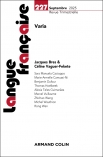
Langue française n° 161 (1/2009)
Pour acheter ce numéro, contactez-nous
Recevez les numéros de l'année en cours et accédez à l'intégralité des articles en ligne.
La distinction Adverbes de phrase vs Adverbes adjoints ou intégrés à la proposition est devenue classique aujourd’hui. Tandis que les seconds portent sur le verbe ou tel ou tel constituant auprès duquel ils jouent le rôle de modifieur, les premiers portent sur la phrase prise globalement, à laquelle ils assignent des< commentaires de diverses sortes . Dans l’ensemble des adverbes de phrase, une fois isolés les adverbes conjonctifs – ou connecteurs, qui établissent un lien entre la phrase où ils figurent et une ou des phrases du contexte gauche –, il semble légitime de distinguer deux grandes classes d’adverbes, ceux qui concernent l’acte d’énonciation et ceux qui concernent le contenu de l’énoncé.
General works on adverbs, but also textbook grammars in their chapter on this part of speech, all recognise a category whose most neutral label, theoretically speaking, is that of “utterance-level adverbs”. The most representative of these are the adverbs franchement (“frankly”), honnêtement (“honestly”), sincèrement (“sincerely”), etc. These works also agree on the overall definition of the category: these are adverbs which serve to refer to the particular conditions of production of a speaker’s utterance. Within this category of utterance-level adverbs, which in large part is constituted differentially in relation to the others, we argue for the following semantic sub-categories :
1. Adverbs denoting the speaker’s psychological or moral stance with respect to the addressee. For example, franchement, honnêtement, sincèrement, entre nous (“between you and me”), etc.
2. Adverbs expressing some kind of comment by the speaker on the make-up of the utterance (e.g.concrètement (“concretely”), objectivement (“objectively”), en clair (“specifically”) , en gros (“in general terms”), etc.).
3. Adverbs having to do with the source of the information at issue:
3.1. Adverbs of personal opinion (e.g.à mon avis (“in my opinion”), à mon sens (“in my view”), à mon sentiment (“what I feel is…”), etc.).
3.2. Modally-distancing adverbs (e.g.autant que je sache (“as far as I know”), à ma connnaissance (“to my knowledge”) , si j’ai bonne mémoire, sauf erreur de ma part (“if I’m not mistaken”),etc.).
3.3. Evidential adverbs (e.g.à ce que j’ai entendu dire (“from what I’ve heard”), à ce qu’on raconte (“from what they say”), de source (sûre + bien informée + diplomatique)
(“from reliable/well-informed/diplomatic sources”), etc.
3.4. Individuating adverbs (e.g.personnellement (“personally”), en ce qui me concerne (“as faras I’m concerned”), pour ma part (“for my part”)).In this article, we list and briefly summarise this set of forms.

